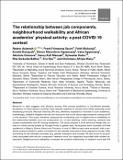| dc.description.abstract | Abstract
Research to date suggests that physical activity (PA) among academics is insufficient globally.
Academics in many African countries were recently required to resume work while observing social
distancing protocols. Physical inactivity (PI) was, therefore, expected to increase in such academics.
Interestingly, walkable neighbourhoods are resources that could discourage excessive sitting and PI
in this situation. This study, therefore, assessed the moderating role of neighbourhood walkability in
the relationship between core job components (i.e. on-site teaching, online teaching, research and
student assessment) and PA among academics. The study adopted a cross-sectional design that utilized an online survey hosted by Google Forms to gather data. Participants were volunteer full-time
academics in Nigeria, Ghana, Kenya and Tanzania. A total of 1064 surveys were analysed, with a sensitivity analysis utilized to select covariates for the ultimate hierarchical linear regression model. After
controlling for the ultimate covariates (e.g. gender, education and income), PA was found to be positively associated with the job component ’research work’ but negatively associated with student assessment. Neighbourhood walkability increased the positive relationship of research work with PA
and reduced the negative relationship of student assessment with PA. The non-significant negative relationship between ‘teaching online’ and PA was made positively significant by neighbourhood walkability. We conclude that research as a job component is positively associated with PA, but online
teaching is negatively associated with PA among African academics in a post-COVID-19 context. | en_US |

